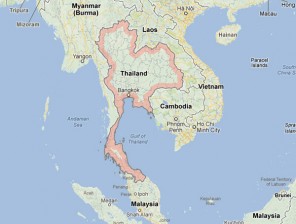
The talks with representatives of the Barisan Revolusi Nasional (BRN) insurgent group, expected to last one day, were to focus on reducing bloodshed, said Thai National Security Council chief Paradorn Pattanatabut, warning the overall peace process would take time.
“Today’s main focus is to reduce violence. Today we will focus on building mutual trust and good relations,” Paradorn told reporters before the talks in the Malaysian capital of Kuala Lumpur.
“I am confident that they will communicate our message to their militants but because BRN is a large organisation we have to give them some time.”
Several shadowy groups are waging the insurgency in Thailand’s southernmost Muslim-majority provinces bordering Malaysia. More than 5,500 people have been killed over the past nine years.
Thailand blamed a Thursday morning bombing that killed three paramilitaries on militants seeking to sabotage the peace effort.
Five paramilitaries were wounded in the roadside bombing that targeted a security patrol in the southern province of Narathiwat.
“Violence this morning is related to the talks in Malaysia,” Thai deputy prime minister Chalerm Yubamrung said in Bangkok.
He said not all militants supported the talks, reiterating the view of many experts who warn of a generational gap between older insurgents who want to negotiate and more militant younger members.
Chalerm also cast doubt on the BRN representatives’ authority to negotiate.
“I am not confident either that they are real core leaders,” he said.
Paradorn had said Wednesday that during the talks Thailand would seek to secure a halt to attacks on civilian targets so it can determine whether the BRN envoys actually control battle-hardened militants on the ground.
There is near-daily violence in southern Thailand including bombings, ambushes and even beheadings, but little is known about the various militant groups’ identities, structures or aims.
The BRN, whose Malay name means “National Revolutionary Front”, is one of the larger groups held responsible by Thailand for the violence.
“I’d like to be more optimistic, but I’m afraid my sense is that if these talks are going to accomplish anything, it’s going to take a long time,” said Liow Chin Yong, an international studies professor at Singapore’s Nanyang Technological University.
He added: “It remains to be seen whether (BRN representative) Ustaz Hassan Taib has any clout at all over those fighting on the ground.”
But Paradorn said Thailand hoped BRN’s involvement would trigger other groups to join future talks.
“I see BRN as the largest and most influential group behind the unrest, so after the talks BRN can spread the word to their fighters and then we will see a concrete result,” he said.
BRN representatives did not make themselves available for comment.
The roots of the Thai insurgency draw on longstanding ethnic Malay antipathy to rule by Buddhist Thailand, which started when Bangkok annexed the region in 1902.
Muslim-majority Malaysia has already hosted negotiations between the Philippines and Muslim separatists in that country which resulted in a landmark agreement in October aimed at ending a decades-long insurgency there.